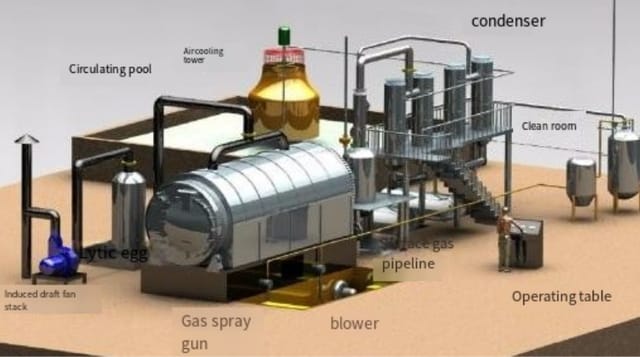Valves for Delayed Coking: A Guide
6 min read
Overview of Delayed Coking Units
Delayed coking is a vital technology in deep crude oil processing. It involves thermally cracking and condensing heavy oils at high temperatures (approximately 500°C) to produce gas, naphtha, diesel, wax oil, and coke. This process uniquely produces petroleum coke. The gas generated undergoes desulfurization and can be used for hydrogen production or as fuel. Despite producing valuable products like coking gasoline and diesel, these have high olefin content and impurities like sulfur, nitrogen, and oxygen, making them unstable and suitable only as intermediates. Petroleum coke from delayed coking can serve in electrode production, metallurgy, and as fuel, depending on its quality.

Overview of Valve Applications
1. Feedstock Preheating System
- Valve Material: For feedstock oil with temperatures exceeding 240°C, carbon steel or alloy steel should be selected according to relevant standards. Non-metallic sealing materials must withstand the medium's temperature.
- Valve Types: For viscous mediums, ball valves are ideal shutoff valves. Gate valves can also be considered based on viscosity. Bypass valves should be globe valves. Butterfly valves are unsuitable as shutoff valves, and wafer check valves should be avoided at high temperatures. Y-pattern lift check valves are recommended for DN≤40.
- Connections: Due to low medium pressure, flanged valve bonnet/body connections are preferred. High-strength alloy steel bolts should be used.
2. Coking Reaction System
- Valve Material: Considering the high temperature (up to 510℃) and strong sulfur corrosion, C5, C12A alloy steel and other materials should be selected. Valve stems should be made of A565Gr.616HT material to avoid 475°C brittleness.
- Valve Types: For potential coking pipelines, ball valves are the best shutoff valves, though gate valves are also an option. Globe valves are recommended for bypasses with a Y-pattern structure. Wafer check valves should be avoided; Y-pattern lift check valves are suitable for DN≤40.
- Connections: Flanged connections with high-strength alloy steel bolts are recommended. Four-way ball valves are used for the coking tower's inlet and outlet, usually integrated into automatic control systems.
3. Fractionation System
- Valve Material: Due to the presence of C3, C4, H2S, HCN and other harmful substances, parts should meet the NACEMR0103 standard. Quality control of metal parts under pressure shall include non-destructive testing.
- Valve Types: Reliable shut-off valves such as gate, globe and ball valves are recommended. For liquefied petroleum gas (LPG), valves with nominal pressure classes below class 300 should be integrated with an automatic pressure relief system. Wafer check valves are not recommended.
- Other Considerations: For welded connections with DN≤40, the valve end should be short tube, and post-welding heat treatment and final sealing surface treatment.
4. Absorption Stabilization System
- Valve Material: Due to the presence of H2S and HCN, the pressure parts shall comply with NACEMR0103 standards. Valves must have a low leakage structure.
- Valve Types: For LPG lines, the rated pressure should not be lower than LPG vapor pressure. It is recommended to use a globe valve as a shut-off valve, while gate and ball valves should have a decompression system.
Conclusion
Selecting the right valve for a delayed coker is critical to safety, efficiency and longevity. Each system - feedstock preheating, coking reaction, fractionation and absorption stabilization - has unique requirements based on the temperature, pressure and chemical composition of the medium. Selecting the right materials, valve types and connections can significantly improve the performance and reliability of delayed coking processes.
FAQs
- What is the primary purpose of delayed coking?
- Delayed coking primarily aims to thermally crack and condense heavy oils to produce lighter hydrocarbons and petroleum coke.
- Why are ball valves preferred for viscous mediums?
- Ball valves provide reliable shutoff capabilities and minimal resistance, making them suitable for managing viscous mediums.
- What materials are recommended for high-temperature valve applications?
- For high temperatures, alloy steels like 5Cr, 9Cr, and A565Gr.616HT are recommended due to their durability and resistance to brittleness.
- How do temperature fluctuations affect valve selection in coking units?
- Temperature fluctuations can cause fatigue damage to valve materials, so materials must be chosen for their ability to withstand these changes without degrading.
- Why is non-destructive testing essential for pressure-bearing parts?
- Non-destructive testing ensures the integrity of pressure-bearing parts by detecting internal and surface defects, crucial for maintaining safety and reliability.





